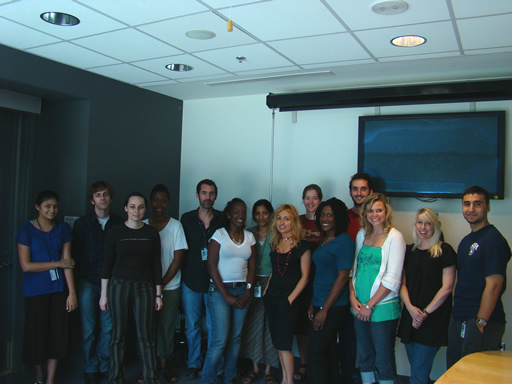| |
| |
| Andrew Singleton, Ph.D., Investigator |
 |
Dr. Singleton received his B.S. degree from the University of Sunderland and his Ph.D. from the University of Newcastle upon Tyne, where he studied genetic causes and contributors to dementia. Dr. Singleton did postdoctoral training at the Mayo Clinic in Jacksonville Florida, studying the genetic basis of neurological diseases such as dystonia, ataxia, essential tremor and Parkinson's disease. In 2001 he joined the NIA as an Investigator within the newly created Laboratory of Neurogenetics. In 2007 Dr. Singleton became a Senior Investigator within NIA. Dr. Singleton was selected for the NIH Director's award in 2008. Dr. Singleton serves on the editorial board of Annals of Neurology, Neurogenetics and Neurodegenerative Diseases and is a member of the Scientific Advisory board for the Michael J Fox Foundation for Parkinson's Disease Research, the Dystonia Medical Research Foundation and the Lewy Body Dementia Association. Dr. Singleton's group investigates the genetic and cellular mechanisms underlying simple-Mendelian and complex neurological diseases.
|

|
Staff:

- Ms. Taura Barr, B.S., Graduate Student barrt@mail.nih.gov
- Mr. Jose Bras, M.S., Graduate Student brasj@mail.nih.gov
- Ms. Angela Britton, M.S., Biologist brittonan@mail.nih.gov
- Dr. Maria del mar Matarin, Ph.D., Research Fellow matarinm@mail.nih.gov
- Ms. Rita Guerreiro, M.S., Graduate Student portalegrer@mail.nih.gov
- Ms. Dena Hernandez, M.S., Biologist hernand@mail.nih.gov
- Ms. Janel Johnson, B.Sc., Graduate Student johnja@mail.nih.gov
- Dr. Mike Nalls, Postdoctoral Fellow nallsm@mail.nih.gov
- Dr. Sonja Scholz, M.D., Research Fellow scholtzs@mail.nih.gov
- Ms. Jennifer Schymick, B.S., Graduate Student schymickj@mail.nih.gov
- Mr. Javier Simon-Sanchez, B.Sc., Graduate Student jsimon@ibv.csic.es
- Ms. Joyce van de Leemput, M.S., Graduate Student vandeleemputj@mail.nih.gov
- Ms. Nicole Washecka, B.S., Biologist washeckan1@mail.nih.gov
- Ryan Reza Zonozi, Postbaccalaureate IRTA zonozirr@mail.nih.gov
Research Interests:
Dr. Singleton's laboratory works on the genetic basis of neurological disorders including Parkinson's disease, dystonia, ataxia, dementia, and amyotrophic lateral sclerosis. This research is performed using a variety of methodologies, including family based linkage and positional cloning in addition to genome-wide association. The goal of Dr. Singleton's research is to identify genetic variability that causes or contributes to neurological disease in order to facilitate understanding of the molecular processes underlying disease.
|
Selected Recent Publications:
Jakobsson M, Scholz SW, Scheet P, Gibbs JR, VanLiere JM, Fung H-C, Szpiech ZA, Degnan JH, Wang K, Guerreiro R, Bras JM, Schymick JC, Hernandez D, Traynor BJ, Simon-Sanchez J, Matarin M, Britton A, van de Leemput J, Rafferty I, Bucan M, Cann HM, Hardy JA, Rosenberg NA, Singleton AB (2008) Genotype, haplotype, and copy number variation in worldwide human populations., Nature 451, 998-1003.
Camargos S, Scholz S, Simon-Sanchez J, Paisan-Ruiz C, Lewis P, Hernandez D, Ding J, Gibbs JR, Cookson MR, Bras J, Guerreiro R, Oliveira CR, Lees A, Hardy J, Cardoso F, Singleton AB (2008) DYT16, a novel young-onset dystonia-parkinsonism disorder: identification of a segregating mutation in the stress response protein prkra., Lancet Neurology 7, 207-215.
van de Leemput J, Chandran J, Knight MA, Holtzclaw LA, Scholz S, Cookson MR, Houlden H, Gwinn-Hardy K, Fung H-C, Lin X, Hernandez D, Simon-Sanchez J, Wood NW, Rafferty I, Hardy J, Storey E, McKinlay Gardner RJ, Forrest SM, Fisher EMC, Russell JT, Cai H, Singleton AB (2007) Deletion at ITPR1 underlies ataxia in mice and humans (SCA15). , PLoS Genetics 6, e108.
Simon-Sanchez J, Scholz S, Fung H-C, MatarinM, Hernandez D, Gibbs JR, Britton A, Wavrant de Vrieze F, Peckham E, Gwinn-Hardy K, Crawley A, Keen J, Nash J, Borgaonkar D, Hardy J and Singleton A (2007) Genome-wide SNP assay reveals structural genomic variation, extended homozygosity and cell-line induced alterations in normal individuals., Human Molecular Genetics 16, 1-14.
Fung H-C, Scholz S, Matarin M, Simon-Sanchez J, Hernandez D, Britton A, Gibbs JR, Langefeld C, Stiegert ML, Schymick J, Okun M, Mandel RJ, Fernandez HH, Foote KD, Rodriguez RL, Peckham E, Wavrant De Vrieze F, Gwinn-Hardy K, Hardy JA, Singleton AB (2006) Genome Wide Genotyping in Parkinson's Disease and Neurologically Normal Controls; First Stage Analysis and Public Release of Data., Lancet Neurology 5, 911-16.
Hernandez DG, Paisan-Ruiz C et al (2005) Clinical and positron emission tomography of Parkinson's disease caused by LRRK2, Annals of Neurology 57, 453-456.
Nichols W, Pankratz N et al. (2005) Genetic screening for a single common LRRK2 mutation in familial Parkinson's disease , Lancet 365, 410-12.
All Selected Publications
Contact Information:
Dr. Andrew Singleton
Laboratory of Neurogenetics, NIA
Porter Neuroscience Research Center
Building 35, Room 1A1014
35 Convent Drive, MSC 3707
Bethesda, MD 20892-3707
Telephone: (301) 451-6079 (office),
(240) 539-1326 (fax)
Email: singleta@mail.nih.gov
|
|















